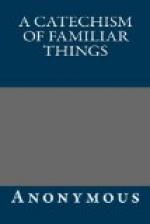Insipid, tasteless.
What is Wind?
Air in motion with any degree of velocity.
What is Lightning?
The effect of electricity in the clouds. A flash of lightning is simply a stream of the electric fluid passing from the clouds to the earth, from the earth to the clouds, or from one cloud to another. Lightning usually strikes the highest and most pointed objects, as high hills, trees, spires, masts of ships, &c.
What is Thunder?
The report which accompanies the electrical union of the clouds: or the echoes of the report between them and the earth. Thunder is caused by a sudden discharge of electrical matter collected in the air, by which vibrations are produced, which give rise to the sound.
What is Electricity?
One of those agents passing through the earth and all substances, without giving any outward signs of its presence, when at rest; yet when active, often producing violent and destructive effects. It is supposed to be a highly elastic fluid, capable of moving through matter. Clouds owe their form and existence, probably, to it; and it passes through all substances, but more easily through metals, water, the human body, &c., which are called conductors, than through air, glass, and silk, which are called non-conductors. When bodies are not surrounded with non-conductors, the electricity escapes quickly into the earth.
To what part of bodies is Electricity confined?
To their surfaces, as the outside may be electric, and the inside in a state of neutrality. The heat produced by an electric shock is very powerful, but is only accompanied by light when the fluid is obstructed in its passage. The production and condensation of vapor is a great source of the atmospheric electricity.
Condensation,
the act of making any body dense or compact;
that is, of bringing
its parts into closer union.
In what other sense is the term Electricity employed?
This term is also employed to designate that important branch of knowledge which relates to the properties shown by certain bodies when rubbed against, or otherwise brought in contact with, each other, to attract substances, and emit sparks of fire.
Designate, to point out by some particular token.
Emit, to send forth, to throw out.
[Illustration: CUTTING AND GATHERING ICE, ON THE HUDSON RIVER, NEW YORK.]
Whence is the word derived?
From electron, the Greek word for amber, a yellow transparent substance, remarkable for its electrical power when rubbed: amber is of a resinous nature, and is collected from the sea-shore, or dug from the earth, in many parts of the world. It is employed in the manufacture of beads and other toys, on account of its transparency; is of some use in medicine, and in the making of varnishes.




